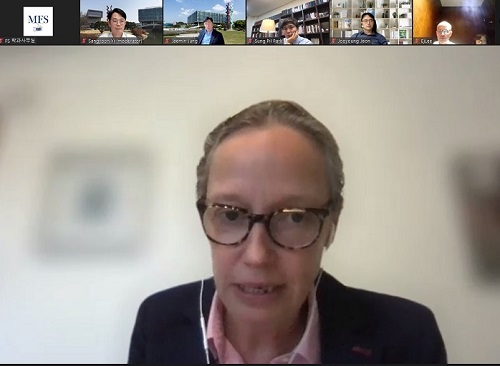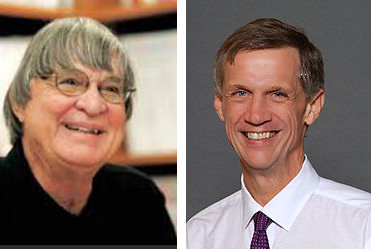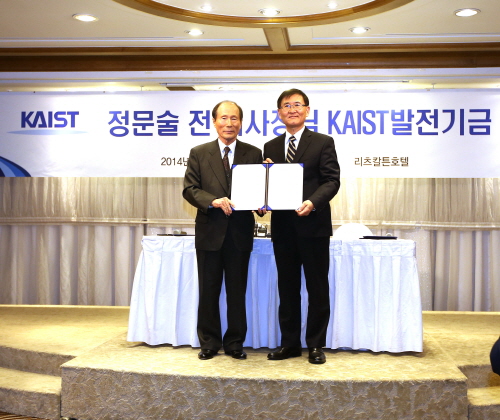future+strategy
-
 Marien Buissonniere Awarded the 9th Grand Award for Future Strategy
Global healthcare and humanitarian activist honored by the Grand Award for Future Strategy
The Moon Soul Graduate School of Future Strategy awarded the 9th Grand Award for Future Strategy to Marine Buissonniere, an independent advisor and practitioner in the fields of global health and humanitarian action. She currently works as a senior advisor to the Prevent Epidemics team at Resolve to Save Lives. She also co-chairs Doctors Without Borders’ Transformational Investment Capacity.
Buissonniere was recognized for designing and implementing global response strategies in global strife and disaster stricken areas over the 25 years while serving as secretary general of Doctors Without Borders. She has been working with various government agencies around the world including Resolve to Save Lives to respond to the Covid-19 pandemic and preparing global future strategies for the post-pandemic era.
The Grand Award for Future Strategy recognizes individual and organization who have contributed to the nation and humanity through future research and strategies in the fields of science and technology, economy and industry, society and culture, politics and governance, and resources and environment.
The selection committee place particular emphasis on her humanitarian efforts toward North Korea. She was in charge of the task force for resuming the health project in North Korea and facilitated the North Korean program in 2002. She also played a significant role in raising awareness of North Korea’s humanitarian issues in the international community by lecturing at Columbia and Princeton.
Buissonniere said during the awards ceremony held online on November 5, “I am very grateful to receive this award from KAIST, a world’s top-flight university as well as from South Korea related to the Korean Peninsula and North Korea, where I have spent most of my life. What makes this award even more special is it is about the international medical relief activities and system innovations that I’ve devoted my life to over the last 25 years. I am going to continue this journey to help many people in difficult situations. Eventually, I would like to make it possible for those people in need to make their own future by themselves.”
2021.11.11 View 7784
Marien Buissonniere Awarded the 9th Grand Award for Future Strategy
Global healthcare and humanitarian activist honored by the Grand Award for Future Strategy
The Moon Soul Graduate School of Future Strategy awarded the 9th Grand Award for Future Strategy to Marine Buissonniere, an independent advisor and practitioner in the fields of global health and humanitarian action. She currently works as a senior advisor to the Prevent Epidemics team at Resolve to Save Lives. She also co-chairs Doctors Without Borders’ Transformational Investment Capacity.
Buissonniere was recognized for designing and implementing global response strategies in global strife and disaster stricken areas over the 25 years while serving as secretary general of Doctors Without Borders. She has been working with various government agencies around the world including Resolve to Save Lives to respond to the Covid-19 pandemic and preparing global future strategies for the post-pandemic era.
The Grand Award for Future Strategy recognizes individual and organization who have contributed to the nation and humanity through future research and strategies in the fields of science and technology, economy and industry, society and culture, politics and governance, and resources and environment.
The selection committee place particular emphasis on her humanitarian efforts toward North Korea. She was in charge of the task force for resuming the health project in North Korea and facilitated the North Korean program in 2002. She also played a significant role in raising awareness of North Korea’s humanitarian issues in the international community by lecturing at Columbia and Princeton.
Buissonniere said during the awards ceremony held online on November 5, “I am very grateful to receive this award from KAIST, a world’s top-flight university as well as from South Korea related to the Korean Peninsula and North Korea, where I have spent most of my life. What makes this award even more special is it is about the international medical relief activities and system innovations that I’ve devoted my life to over the last 25 years. I am going to continue this journey to help many people in difficult situations. Eventually, I would like to make it possible for those people in need to make their own future by themselves.”
2021.11.11 View 7784 -
 The KAIST Graduate Program for Future Strategy Holds Symposium on Futurology
The KAIST Graduate Program for Future Strategy held the 2014 Futurology Symposium entitled "Limits to Growth and Quantum Jumps"
at the Korea Press Center on April 3rd. The symposium was organized in efforts to
overcome the limits of Korean society’s growth potential and find a new growth momentum.
Three types of sessions took place: special lectures, field-specific subject presentations, and comprehensive debates.
As keynote speakers, Jim Dator, a professor at the University of Hawaii, lectured on Korea’s limits and possibilities, and David E. Van Zandt, the president of the New School in New York City on future social changes and our choice.
The seven field-specific subject presentations included: "The re-framing of social conflicts and frames" by Young-Jin Kang of Sungkyunkwan University, "The limits of technology and three-dimensional tech-knowledge solutions" by Chun-Taek Rim of KAIST, and "The limits of capitalism and the present financial system" by
Su-Chan Chae of KAIST
.
In addition, Yong-Suk Seo of the Korea Institute of Public Administration made a presentation on the "Population structure change and three future strategy options," Se-Yeon Kim, Congressman of the Saenuri party, on "The limits of politics and future strategy organization," and Seung-Bin Park, Dean of the KAIST College of Engineering, on the "Energy exhaustion and environmental problems."
The debate topic at the third session,
chaired by Kyu-Yeon Lee, a member of the editorial board of
Joongang Ilbo,
a Korean
daily newspaper, was "The limits of growth and another leap proposed by opinion leaders of Korea."
The seven
fields
stand for society, technology, economy, population, politics, environment, and resource, the major elements that bring
changes
in future society.
Jim Dator (left) and
David E. Van Zandt (right)
2014.04.04 View 8027
The KAIST Graduate Program for Future Strategy Holds Symposium on Futurology
The KAIST Graduate Program for Future Strategy held the 2014 Futurology Symposium entitled "Limits to Growth and Quantum Jumps"
at the Korea Press Center on April 3rd. The symposium was organized in efforts to
overcome the limits of Korean society’s growth potential and find a new growth momentum.
Three types of sessions took place: special lectures, field-specific subject presentations, and comprehensive debates.
As keynote speakers, Jim Dator, a professor at the University of Hawaii, lectured on Korea’s limits and possibilities, and David E. Van Zandt, the president of the New School in New York City on future social changes and our choice.
The seven field-specific subject presentations included: "The re-framing of social conflicts and frames" by Young-Jin Kang of Sungkyunkwan University, "The limits of technology and three-dimensional tech-knowledge solutions" by Chun-Taek Rim of KAIST, and "The limits of capitalism and the present financial system" by
Su-Chan Chae of KAIST
.
In addition, Yong-Suk Seo of the Korea Institute of Public Administration made a presentation on the "Population structure change and three future strategy options," Se-Yeon Kim, Congressman of the Saenuri party, on "The limits of politics and future strategy organization," and Seung-Bin Park, Dean of the KAIST College of Engineering, on the "Energy exhaustion and environmental problems."
The debate topic at the third session,
chaired by Kyu-Yeon Lee, a member of the editorial board of
Joongang Ilbo,
a Korean
daily newspaper, was "The limits of growth and another leap proposed by opinion leaders of Korea."
The seven
fields
stand for society, technology, economy, population, politics, environment, and resource, the major elements that bring
changes
in future society.
Jim Dator (left) and
David E. Van Zandt (right)
2014.04.04 View 8027 -
 KAIST receives $20 million donation for futures studies
A retired businessman, Moon-Soul Chung, the former chief executive officer of Mirae, Inc., a semiconductor equipment company in Korea, today donated USD 20 million to the Graduate School of Future Strategy at KAIST.
It was Chung's second contribution to KAIST—his first donation of USD 28 million in 2001 supported the construction of the Bio and Brain Engineering building, a major research center on campus where biotechnology and information technology converge.
Established in 2013, the KAIST Graduate School of Future Strategy consists of three interdisciplinary graduate programs on future strategy, intellectual property, and science journalism. The Research Center for Future Strategy is an affiliate of the graduate school. KAIST is the first Korean university that offers an academic program granting a degree in futures studies.
The rapid advancement in science and technology today affects, profoundly and extensively, all corners of global society from education, politics, economy, and environment to resources, sustainability, and inequality. As we live in a highly interconnected, digitalized, and unpredictable world, analyzing the events, trends, patterns, and changes of the past and present, developing foresight, and mapping preferred futures have become more relevant than ever.
KAIST utilizes its strong tech-knowledge base in science and engineering to offer students a high quality education and training in futures thinking, skills, and methodologies to develop foresight and to plan future strategies for international relations, business and industry, national defense, science and technology, and new media. KAIST also anticipates helping government, business, public service, and non-profit organizations identify important issues and develop long-range implementation strategies to prepare for probable and preferred futures.
Moon-Soul Chung (left), the former CEO of Mirae Inc., and President Steve Kang (right), holding together the donation agreement in Seoul, January 10th, 2014
2014.01.13 View 9588
KAIST receives $20 million donation for futures studies
A retired businessman, Moon-Soul Chung, the former chief executive officer of Mirae, Inc., a semiconductor equipment company in Korea, today donated USD 20 million to the Graduate School of Future Strategy at KAIST.
It was Chung's second contribution to KAIST—his first donation of USD 28 million in 2001 supported the construction of the Bio and Brain Engineering building, a major research center on campus where biotechnology and information technology converge.
Established in 2013, the KAIST Graduate School of Future Strategy consists of three interdisciplinary graduate programs on future strategy, intellectual property, and science journalism. The Research Center for Future Strategy is an affiliate of the graduate school. KAIST is the first Korean university that offers an academic program granting a degree in futures studies.
The rapid advancement in science and technology today affects, profoundly and extensively, all corners of global society from education, politics, economy, and environment to resources, sustainability, and inequality. As we live in a highly interconnected, digitalized, and unpredictable world, analyzing the events, trends, patterns, and changes of the past and present, developing foresight, and mapping preferred futures have become more relevant than ever.
KAIST utilizes its strong tech-knowledge base in science and engineering to offer students a high quality education and training in futures thinking, skills, and methodologies to develop foresight and to plan future strategies for international relations, business and industry, national defense, science and technology, and new media. KAIST also anticipates helping government, business, public service, and non-profit organizations identify important issues and develop long-range implementation strategies to prepare for probable and preferred futures.
Moon-Soul Chung (left), the former CEO of Mirae Inc., and President Steve Kang (right), holding together the donation agreement in Seoul, January 10th, 2014
2014.01.13 View 9588